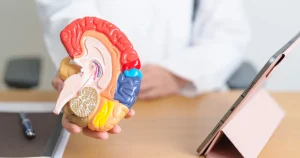
Brain shrinkage or decrease in brain volume begins when people reach their 30s or 40s and accelerates as they become older. This is a physiological process that is associated with age but is affected by environmental factors as well.[1] Different areas of the brain shrink at different rates. As the total brain volume decreases, the number of nerve fibers that carry information from the brain to the body and vice versa and synapses (connections) between the brain cells also decreases. This leads to many age-related cognitive changes, such as:
- Impaired memory
- Communication problems
- Difficulty in learning new information
- Slower brain function
What are the causes of brain shrinkage?
As mentioned earlier, advancing age is one of the foremost causes of brain shrinkage. Some other factors that contribute to a decrease in total brain volume are:
- Increased intake of sugar
- Deficiency of essential fats
- Alcoholism
- Neurological diseases
How can you slow down brain shrinkage?
While age-related changes in the brain are inevitable, certain lifestyle modifications can help slow down cognitive decline and improve brain health.Some ways in which reduction in brain volume can be prevented are:
- Eating a healthy diet
- Staying physically active
- Staying mentally active
- Quitting smoking and alcohol
- Improving your heart health
Click to schedule Trigger Point Therapy with us, and let your healing begin!
Contact us for effective shockwave relief—click here!
Get AppointmentCitations
- Peters R. (2006). Ageing and the brain. Postgraduate medical journal, 82(964), 84–88. https://doi.org/10.1136/pgmj.2005.036665
- Mortby, M. E., Janke, A. L., Anstey, K. J., Sachdev, P. S., & Cherbuin, N. (2013). High “normal” blood glucose is associated with decreased brain volume and cognitive performance in the 60s: the PATH through life study. PloS one, 8(9), e73697. https://doi.org/10.1371/journal.pone.0073697
- Raji, C. A., Lopez, O. L., Kuller, L. H., Carmichael, O. T., & Becker, J. T. (2009). Age, Alzheimer disease, and brain structure. Neurology, 73(22), 1899–1905. https://doi.org/10.1212/WNL.0b013e3181c3f293
- Tangney, C. C., Aggarwal, N. T., Li, H., Wilson, R. S., Decarli, C., Evans, D. A., & Morris, M. C. (2011). Vitamin B12, cognition, and brain MRI measures: a cross-sectional examination. Neurology, 77(13), 1276–1282. https://doi.org/10.1212/WNL.0b013e3182315a33
Categories
Tags
Auto Injuries
Back Pain
Body Cupping
Brain Shrinkage
Carpal Tunnel Syndrome
Chiropractic
chiropractic care
Chiropractic Care During Pregnancy
Chronic Back Pain
Clinic
Diet
Drug Toxicity
Dupuytren's Syndrome
Exercise
Fibromyalgia
Foot Pain
Healthy Life
Hip Bursitis
Knee Pain
Nutrition
Organ Function
Overall Health
Pain
Plantar Fasciitis
Posture
Runner's Knee
sciatica pain
Shockwave Therapy
Shoulder Pain
Spinal Manipulation
Spinal Misalignment
Spinal Subluxation
Spine Pain
Tendonitis Pain
Trigger Point Therapy
Wellness
Recent Blogs




Leave A Comment